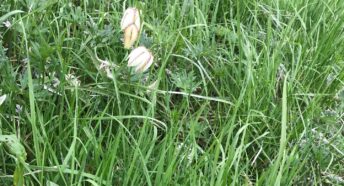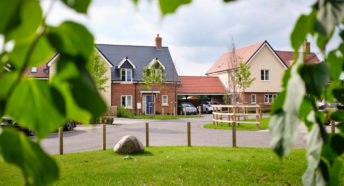Time to rethink our farming and save our soils

Alerted to a gardening article in the county media singing the praises of a report from CPRE, the countryside charity, on the importance of our soils, we thought this would be a salient time to revisit it ourselves.
The report, Back to the Land: Rethinking Our Approach to Soil, was published in December 2018 and calls for a radical rethink of farming practices and soil management to help regenerate the soils that underpin our supply of food and environment. It sets out practical ways to restore soil and new approaches to policy.
Soil provides many benefits to the health of humans as well as our landscapes and wider environment. It is not only fundamental to the production of food but also filters and stores excess water in the ground and absorbs carbon dioxide from the atmosphere, making it critical in the fight against climate change.
However, CPRE points out that a combination of industrial farming practices, poor land management and damage from development have created a perfect storm that has resulted in dangerous levels of soil erosion, compaction and a loss of soil’s fertility – this degradation of soil costs some £1.2 billion a year in England and Wales alone.
The report highlights that common farming techniques such as inversion ploughing, as well as overgrazing and compaction from heavy machinery, has led to almost three million tonnes of topsoil being eroded every year across the UK.
These forms of soil degradation have left an area of farmland the size of Yorkshire at risk of further erosion – more than a third of all of the UK’s arable land.
Graeme Willis, CPRE senior rural policy campaigner, said: “Soil must be seen as a fundamental asset for delivering productive farming and a healthy countryside.
“For far too long we have been ignoring the fragility of such a precious commodity. Only now is the government starting address the damage decades of neglect has caused.
“Ensuring our soils are healthy is crucial if we are to effectively tackle climate change – or mitigate its worst effects. New agriculture policy must promote measures that support farmers to sustainably manage, protect and regenerate soils, and drive carbon from the atmosphere back into the ground.”
Damage from development is also a major threat to health of England’s soils, says the report. Based on current annual rates of land lost to development, CPRE warns that 1,580 sq km of farmland, an area the size of Greater London, will be lost within a decade.
In addition to killing soil by sealing it with concrete or tarmac, development projects also excavate tens of millions of tonnes of soil every year, much of which is treated as waste.
The most recent data highlighted in the report show that in 2014, in the UK, more than 20 million tonnes of soil was sent to landfill – equivalent to the weight of more than 400 Titanics – and that almost half (45 per cent) of all ‘waste’ buried in the same year was soil.
CPRE is warning that, to effectively address climate change and limit global temperature rises to 1.5°C in the timeframes set out by the Intergovernmental Panel on Climate Change (IPCC), urgent action is needed to halt the degradation and loss of our soils.
In the UK, soil stores roughly 10 billion tonnes of carbon – the equivalent of 70 years of annual UK greenhouse gas emissions. However, degradation has led to most arable soils having already lost 40-60% of their organic carbon.
Preventing the loss of greenhouse gases from soils and rebuilding their carbon stores means that better farming and land use will be crucial in our attempt to limit the worst effects of climate change.
If properly managed, soils could help to reduce the flooding and erosion that more frequent extreme weather is bringing. However, if continued to be managed badly, soils will lack the resilience to cope with storms or drought, CPRE fears.
The report sets out five innovative yet practical solutions that would reduce the degradation and loss of soil and help to regenerate it through sustainable management.
The first four relate to farming practice and the last to how policy might reduce damage to soils from development.
Soil-sensitive farming such as conservation agriculture, agroforestry, pasture-based livestock farming and farming on rewetted peatlands, if scaled up, would help the government reach its emissions targets by locking in carbon, as well as help combat the effects of climate change, improve water quality and restore the health of the natural environment.
CPRE suggests specific policy measures that could support the scaling up of these approaches, such as ensuring the Environmental Land Management scheme is properly funded and incentivises farmers by rewarding them for protecting and regenerating soils.
The government must put in place a firm goal to stop soil degradation by 2030 and establish a new goal of net zero greenhouse gas emissions from agriculture by 2050.
- To read Back to the Land: Rethinking Our Approach to Soil, click here
Monday, March 2, 2020
- A number of important documents have yet to emerge. For example, a rigorous transport plan and a finalised air-quality assessment. The latter is critical given that allocations at Teynham will feed extra traffic into AQMAs.
- There seems to be no coherent plan for infrastructure delivery – a key component of the plan given the allocations being proposed near the already crowded Junction 7.
- There seems to have been little or no cooperation with neighbouring boroughs or even parish councils within Swale itself.
The removal of a second consultation might have been understandable if this final version of the plan were similar to that being talked about at the beginning of the consultation process. It is, however, radically different in the following ways:
- There has been a major shift in the balance of housing allocations, away from the west of the borough over to the east, especially around the historic town of Faversham. This is a move that raises many concerns.
- A new large allocation, with accompanying A2 bypass, has appeared around Teynham and Lynsted, to which we are objecting.
- Housing allocations in the AONB around Neames Forstal that were judged “unsuitable” by the council’s own officers have now appeared as part of the housing numbers.
- Most of the housing allocations being proposed are on greenfield sites, many of them on Grade 1 agricultural land – a point to which we are strongly objecting.
Concerns about the rush to submit the plan
The haste with which the plan is being prepared is especially worrying given the concentration of housing in Faversham. If the town is to take a large amount of new housing, it is imperative that the policies concerning the area are carefully worked out to preserve, as far as possible, the unique nature of the town. The rush to submit the plan is likely to prove detrimental.
As Swale does not have a five-year land housing supply, it is open to speculative development proposals, many of which would run counter to the ideas contained in the current plan. Some are already appearing. This is a common situation, and one that, doubtless, is a reason behind Swale’s haste.
Our overriding fear, however, is that this emphasis on haste is ultimately going to prove counterproductive. This is because it is our view that the plan, in its current form, is unlikely to pass independent examination. We are urging Swale to listen to and act upon the comments being made about the plan and to return the plan to the council with appropriate modifications before submitting it to the Secretary of State.
Essentially, this means treating the current consultation not as the final one but as the ‘lost’ second consultation.
The consultation ends on Friday 30 April and we strongly urge residents to make their opinions known if they have not already done so.
Further information








